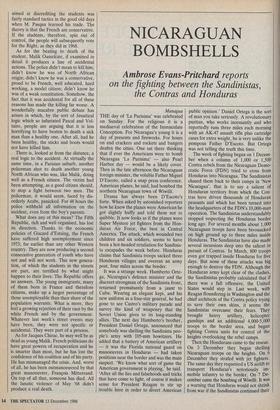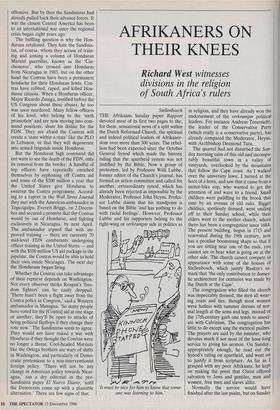NICARAGUAN BOMBSHELLS
Ambrose Evans-Pritchard reports
on the fighting between the Sandinistas, the Contras and Honduras
Managua
THE day of 'La Purisima' was celebrated on Sunday. For the religious it is a mediaeval celebration of the Immaculate Conception. For Nicaragua's young it is a day of presents and fireworks. For hours on end crackers and rockets and bangers deafen the cities. One sat there thinking that if ever the Americans were to bomb Nicaragua 'La Purisima' — also Pearl Harbor day — would be a likely cover. Then in the late afternoon the Nicaraguan foreign minister, the voluble Father Miguel D'Escoto, called a snap press conference. American planes, he said, had bombed the northern Nicaraguan town of Wiwilli.
Drama has always been D'Escoto's forte. When asked by astonished reporters how he knew the planes were American he got slightly huffy and told them not to quibble. It now looks as if the planes were Super Mystere jet fighters from the Hon- duran Air Force, the best in Central America. The attack, which wounded two children and six soldiers, seems to have been a hot-headed retaliation for Sandinis- ta escapades the week before. Honduras claims that Sandinista troops sacked three Honduran villages and overran an army post, four miles across the border.
It was a strange week. Humberto Orte- ga, Nicaragua's defence minister and the discreet strongman of the Sandinista front, returned prematurely from a jaunt to Cuba. Wearing an elegant kepi, and his new uniform as a four-star general, he had gone to see Castro's military parade and survey the kind of weaponry that the Soviet Union gives to its long-standing allies. The next day Humberto's brother, President Daniel Ortega, announced that somebody was shelling the Sandinista peo- ple's army with 105-mm howitzers. He added that a battery of American artillery — it was the Florida national guard on manoeuvres in Honduras — had taken positions near the border and was the main suspect. 'We know what sort of game the American government is playing,' he said. `After all the lies and falsehoods and tricks that have come to light, of course it makes sense for President Reagan to stir up trouble here in order to divert American public opinion.' Daniel Ortega is the sort of man you take seriously. A revolutionary puritan, who works incessantly and who reportedly runs three miles each morning with an AK-47 assault rifle plus cartridge cases for extra weight, he is very unlike the pompous Father D'Escoto. But Ortega was not telling the truth this time.
The week of fighting began on 1 Decem- ber when a column of 1,000 or 1,500 Contra rebels from the Nicaraguan Demo- cratic Force (FDN) tried to cross from Honduras into Nicaragua. The Sandinistas chased them back to their camps in 'New Nicaragua', that is to say a salient of Honduran territory from which the Con- tras have driven thousands of Honduran peasants and which has been turned into the headquarters of the FDN's 10,000-man operation. The Sandinistas understandably stopped respecting the Honduran border long ago. For several months about 1,000 Nicaraguan troops have been bivouacked on high ground up to three miles inside Honduras. The Sandinistas have also made several incursions deep into the salient in pursuit of Contras. In March, 800 troops even got trapped inside Honduras for five days. But none of these attacks was big enough to destroy the FDN. Although the Honduran army kept clear of the clashes, the Sandinistas probably calculated that if there was a full offensive, the United States would step in. Last week, with Reagan floundering in Washington and the chief architects of the Contra policy trying to save their own skins, it seems the Sandinistas overcame their fears. They brought heavy artillery, helicopter gunships and an additional 4,000-5,000 troops to the border area, and began fighting Contra units for control of the heights overlooking the rebel camps.
Then the Hondurans came to the rescue. On 3 December they began shelling Nicaraguan troops on the heights. On 6 December they strafed with jet fighters. The same day they requested a US airlift to transport Honduras's notoriously im- mobile infantry to the border. On 7 De- cember came the bombing of Wiwilli. It was a warning that Honduras would not shrink from war if the Sandinistas continued their offensive. But by then the Sandinistas had already pulled back their advance forces. It was the closest Central America has been to an international war since the regional crisis began eight years ago.
The baffling question is why the Hon- durans retaliated. They hate the Sandinis- tas, of course, whom they accuse of train- ing and arming a column of Honduran Marxist guerrillas, known as the 'Cin- choneros', who crossed into Honduras from Nicaragua in 1983, but on the other hand the Contras have been a permanent headache for their Honduran hosts. Con- tras have robbed, raped, and killed Hon- duran citizens. When a Honduran officer, Major Ricardo Zuniga, testified before the US Congress about these abuses, he too was soon murdered. Many fellow officers of his level, who belong to the 'sixth promotion' and are now moving into com- mand positions, share his dislike for the FDN. They are afraid the Contras will create a 'state within a state' like the PLO in Lebanon, or that they will degenerate into armed brigands inside Honduras.
But the Honduran high command did not want to see the death of the FDN, only its removal from the border. A handful of top officers have reportedly enriched themselves by syphoning off Contra aid and some of the $200 million a year that the United States give Honduras to sweeten the Contra programme. Accord- ing to a report in the Wall Street Journal they met with the American ambassador in Tegucigalpa, Everett Briggs, on 2 Decem- ber and secured a promise that the Contras would be out of Honduras, and fighting exclusively in Nicaragua, by next April. The ambassador argued that with im- proved training — there are currently 70 mid-level FDN combatants undergoing officer training in the United States — and with the $100 million US aid package in the pipeline, the Contras would be able to hold their own inside Nicaragua. The next day the Hondurans began firing.
Whether the Contras can take advantage of their reprieve depends on Washington. Not every observer thinks Reagan's 'free- dom fighters' can be easily dropped. `There hasn't been a flight away from the Contra policy in Congress,' said a Western ambassador in Managua. `So many people have voted for the [Contra] aid at one stage or another, they'll be open to attacks of being political flipflops if they change their vote now.' The Sandinistas seem to agree. They would not have risked a war with Honduras if they thought the Contras were no longer a threat. Cool-headed Marxists like the Ortega brothers are wary of shifts in Washington, and particularly of Demo- cratic pretentions to a non-interventionist foreign policy. 'There will not be any change in American policy towards Nicar- agua,' ran a dry editorial in the pro- Sandinista paper El Nuevo Diario, 'until the Democrats come up with a plausible alternative.' There are few signs of that.



































































 Previous page
Previous page